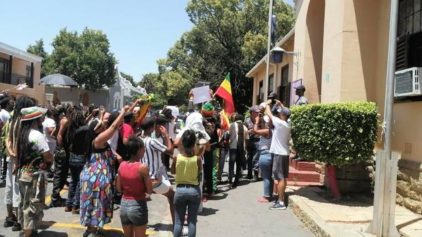The government was unable to meet the demands of South African medical students in Cuba who embarked on an illegal strike earlier this month, and a process of deportation would start “if indeed we cannot meet one another,” the Department of Higher Education and Training said on Tuesday.
Earlier this month, 187 of the 1,200 South African students studying medicine in Cuba went on strike demanding that their monthly stipend of $200 be increased more than 200%. The students also demanded that a health attaché be sent to Cuba, and that they no longer be served any meals that contain pork.
Speaking during a media briefing in Parliament on Tuesday, Higher Education and Training Deputy Minister Mduduzi Manana said the government could not meet the students’ demands, and officials had been assigned to work closely with the health department and the embassy on the issue.
“The reality is that we will not meet the demands of the students … we will arrange with the embassy to begin a process of deportation if indeed we cannot meet one another,” Mr Manana said.
The 1,200 medical students studying in Cuba are provided with full tuition, board and Spanish lessons paid for by the various provincial health departments.
Last week, Health Minister Aaron Motsoaledi wrote to the students telling them the government would not meet their “outrageous and unreasonable demand of $700 per month.”
Health department spokesman Joe Maila last week said: “The minister has stated this point unambiguously and emphasizes that at no stage will such a demand ever be entertained.”
Mr Maila said the students started their strike on February 7 when they first raised the issues of the stipend, health attaché and their refusal to eat the pork provided on campus.
“In dealing with this matter, the department suspected there might also be problems of cultural differences, adaptability and perhaps psychosocial changes, which make it difficult for them to cope with their studies,” he said.
“The department dispatched a senior social worker, a senior psychologist, human resources manager and a doctor who is a beneficiary of the Cuban medical studies to help the students accordingly. The team joined our ambassador in Cuba to negotiate with the students.”
Mr Maila said the Cuban government and the academic staff of the university joined the team to help resolve the matter.
“During negotiations the students presented the embassy in Cuba with two ultimatums: that the ambassador sign a document that these demands will be met or they come back home.”
Mr Maila said Mr Motsoaledi had appointed a health attaché for the first time to Cuba last year, but the official was not able to start yet because of commitments in South Africa.
“The issue of food does time and again arise in universities, even in our own country, and many of us experienced it as students in one way or the other,” he said.
“It has always been a matter negotiated between universities and the student representative councils. Up to now we know of no student who has had to abandon studies because such a matter was not resolved.”
Mr Maila said students in Cuba usually got beef, chicken or pork. However, for the past two or three weeks, the Cuban government has had problems acquiring beef and could serve only pork.
“As to the issue of the stipend, which we regard as pocket money, the position of the department is firm and will never change,” he said.
“Accommodation, food, transport, tuition and all the necessities that enable a student to study are already sponsored jointly by the South African and Cuban governments. The stipend is just to enable students to buy toiletries, soft drinks, entertainment and for their general comfort.
“For the students to believe that if such a demand is not met that they would rather come back home, has left the minister with no option but to grant them their wish,” Mr Maila said.
Source: bdlive.co.za


